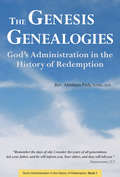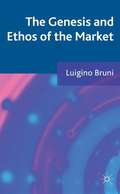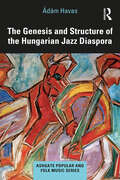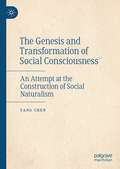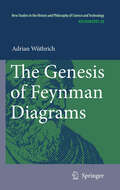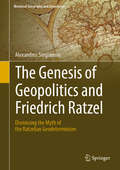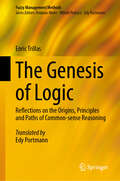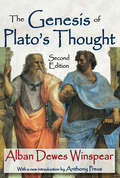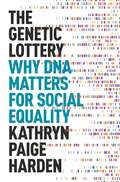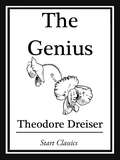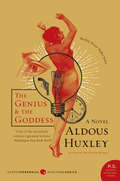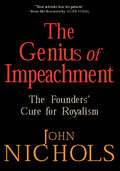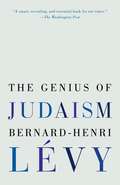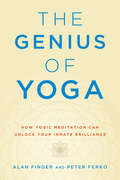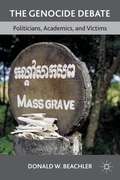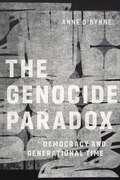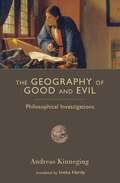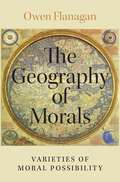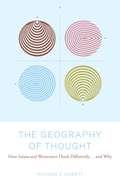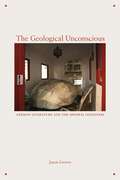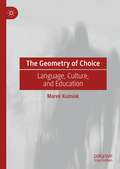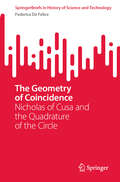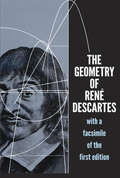- Table View
- List View
The Genesis Genealogies: God's Administration in the History of Redemption
by Abraham ParkA basic part of understanding one's ancestors is knowing when they were born, how long they lived, and when they died. Here in The Genesis Genealogies lies that crucial core information about the forebears of Christianity.Rev. Abraham Park has meticulously analyzed the information in The Book of Genesis. <P><P>Taking the precise date references in Genesis and performing math calculations forward and backward in time, he builds a complete chronological timeline from Adam to the Exodus-allowing us to more deeply understand the layers of meanings that the text offers.
The Genesis and Ethos of the Market
by Luigino BruniA discussion of the anthropological roots of the market, tracing its development using the history of ideas and cultures as well as simple game theory. In his analysis of market ethics Bruni calls for a reconsideration of some of the central tenets of modern political economy, and the need for a new spirit of capitalism.
The Genesis and Structure of the Hungarian Jazz Diaspora (Ashgate Popular and Folk Music Series)
by Ádám HavasIn Hungary, jazz was at the forefront of heated debates sparked by the racialised tensions between national music traditions and newly emerging forms of popular culture that challenged the prevailing status quo within the cultural hierarchies of different historical eras. Drawing on an extensive, four-year field research project, including ethnographic observations and 29 in-depth interviews, this book is the first to explore the hidden diasporic narrative(s) of Hungarian jazz through the system of historically formed distinctions linked to the social practices of assimilated Jews and Romani musicians. The chapters illustrate how different concepts of authenticity and conflicting definitions of jazz as the "sound of Western modernity" have resulted in a unique hierarchical setting. The book's account of the fundamental opposition between US-centric mainstream jazz (bebop) and Bartók-inspired free jazz camps not only reveals the extent to which traditionalism and modernism were linked to class- and race-based cultural distinctions, but offers critical insights about the social logic of Hungary’s geocultural positioning in the ‘twilight zone’ between East and West to use the words of Maria Todorova. Following a historical overview that incorporates comparisons with other Central European jazz cultures, the book offers a rigorous analysis of how the transition from playing ‘caféhouse music’ to bebop became a significant element in the status claims of Hungary’s ‘significant others’, i.e. Romani musicians. By combining the innovative application of Pierre Bourdieu’s cultural sociology with popular music studies and postcolonial scholarship, this work offers a forceful demonstration of the manifold connections of this particular jazz scene to global networks of cultural production, which also continue to shape it.
The Genesis and Transformation of Social Consciousness: An Attempt at the Construction of Social Naturalism
by Yang ChenThis book focuses on the formation of human social consciousness and develops a naturalist approach to social normativity. Beginning from Marx's uncompleted concept of social consciousness, the book retrospects the studies about collective intentionality in the area of philosophy of mind and social ontology. Specifically, a reinterpretation of social consciousness with respect to collective intentionality can offer us a new, naturalistic approach to the social formation and normativity. According to the naturalistic approach, we can discern the inner structure of social consciousness as a systematic pattern of Intentionality. Social consciousness involves three levels of development: subjective, objective and absolute. With this new pattern of social consciousness, the “naturalism” of the young Karl Marx can be revived. And by grasping the most essential ability of human Intentionality as the source of social formation, it also makes an interdisciplinary study of social philosophyand philosophy of mind possible.
The Genesis of Feynman Diagrams
by Adrian WüthrichIn a detailed reconstruction of the genesis of Feynman diagrams the author reveals that their development was constantly driven by the attempt to resolve fundamental problems concerning the uninterpretable infinities that arose in quantum as well as classical theories of electrodynamic phenomena. Accordingly, as a comparison with the graphical representations that were in use before Feynman diagrams shows, the resulting theory of quantum electrodynamics, featuring Feynman diagrams, differed significantly from earlier versions of the theory in the way in which the relevant phenomena were conceptualized and modelled. The author traces the development of Feynman diagrams from Feynman's "struggle with the Dirac equation" in unpublished manuscripts to the two of Freeman Dyson's publications which put Feynman diagrams into a field theoretic context. The author brings to the fore that Feynman and Dyson not only created a powerful computational device but, above all, a new conceptual framework in which the uninterpretable infinities that had arisen in the old form of the theory could be precisely identified and subsequently removed in a justifiable manner.
The Genesis of Geopolitics and Friedrich Ratzel: Dismissing The Myth Of The Ratzelian Geodeterminism (Historical Geography and Geosciences)
by Alexandros StogiannosThis book discusses the influence of Friedrich Ratzel's ideas in more contemporary geopolitical analytical systems and the geodeterminism commonly attributed to him. The author thoroughly analyzes the structural components of Ratzel's thought. The research is inspired by the numerous contradictory approaches in the secondary literature, presenting Ratzel as both humanist and racist, geo-determinist and multidimensional analyst, organicist and social scientist, precursor of Geopolitics and opponent to the same idea. In this work, more particular issues are approached: the establishment of a scientific Political Geography; the methodological approach of his multidisciplinary work; the redefinition of his geopolitical period; his notion of state and the evaluation of sociological and cultural parameters as factors of state power; the biogeographical content of the notion of Lebensraum; his attitude towards the racist theories as well as towards the Darwinian theories; his overall worldview and the confrontation with cosmopolitism; his contribution to an interdisciplinary, positivist and scientific approach in analyzing social and international affairs; his thoughts on the architecture of Europe. The book will be useful for researchers and students in many scientific fields, such as International Relations, Geopolitics, Geography and History of Geography.
The Genesis of Logic: Reflections on the Origins, Principles and Paths of Common-sense Reasoning (Fuzzy Management Methods)
by Enric TrillasThe Genesis of Logic addresses the principles of common-sense reasoning, which are employed in everyday decision-making processes and extend beyond deductive reasoning alone. Linked to language, logic inherits its flexibility. These are a few laws, the 'formal skeleton of reasoning,' based on the relationship of linguistic inference that, while needing to be represented in each context, allow for the consideration of non-comparable, orthogonal statements. By facilitating deduction and abduction, speculation emerges as a fundamental intellectual operation. As a whole, this work offers a new genetic-evolutionary perspective to reconsider Logic, a panoramic outlook that examines laws outside the skeleton as local laws, necessary for the validity of specialized reasoning. It moves away from the rigid reticular structure of sets of statements and views induction as the search for speculations, non-monotonic reasoning as speculative, and conjecture, only proven in finite Boolean algebras,that reasoning involves following paths of inference in a zigzag pattern, alternating between deduction and abduction.
The Genesis of Plato's Thought: Second Edition
by Alban WinspearIt is often said that to understand Plato we must understand his times. Many readers who might accept without question this saying of historical criticism may still wonder why we should think it necessary to begin our enquiry as far back as Homer and beyond. In the case of Plato there is an even greater need to pursue the argument back to the very beginnings of the historical period in which he lived and worked.It is quite impossible to understand the genesis of Plato's ideas without understanding the profound change that Greek society underwent in the post-Homeric period that preceded him. This change in social structure created a mercantile, progressive Greek society, one which laid the foundations for all the subsequent history of Europe and the West. The Genesis of Plato's Thought is particularly highly regarded because it departs vigorously from the traditional abstract, static view of Plato's thought.Winspear's volume on Plato's thought traces, in a realistic fashion, the deep-reaching social and economic roots of Plato's concept of the state and society. Winspear believes that nowhere can the social roots of philosophy be more sharply seen and more firmly apprehended than when one is dealing with the origins of Western philosophy among the Greeks. His book contains the body of information which any reader should have if they wish to approach Plato as a historical figure. To make the book useful to a wide circle of readers, brief biographical identifications for the various important figures of Greek life are introduced in the text.
The Genetic Lottery: Why DNA Matters for Social Equality
by Kathryn Paige HardenA provocative and timely case for how the science of genetics can help create a more just and equal societyIn recent years, scientists like Kathryn Paige Harden have shown that DNA makes us different, in our personalities and in our health—and in ways that matter for educational and economic success in our current society.In The Genetic Lottery, Harden introduces readers to the latest genetic science, dismantling dangerous ideas about racial superiority and challenging us to grapple with what equality really means in a world where people are born different. Weaving together personal stories with scientific evidence, Harden shows why our refusal to recognize the power of DNA perpetuates the myth of meritocracy, and argues that we must acknowledge the role of genetic luck if we are ever to create a fair society.Reclaiming genetic science from the legacy of eugenics, this groundbreaking book offers a bold new vision of society where everyone thrives, regardless of how one fares in the genetic lottery.
The Genetic Origination of Truth-Toward-Being: Edith Stein’s Reconfiguration of Husserl’s Phenomenology
by Jim RuddyUsing both Father Kevin Wall’s eidetic matrix of “the relational unity of being” and Edith Stein’s remarkable synoptic view of intentionality in both Aquinas and Husserl, this book uncovers purely logical ground for a subalternate eidetic science called "convergent phenomenology," itself located at the inmost depths of Husserlian phenomenology. Convergent phenomenology emerges as a distinctively new discipline dealing with relation-like objectivity as opposed to the thing-like objectivity of traditional phenomenology. This has grand implications for the way we as humans conceive of God and being. The book thus benefits theologians, logicians, and phenomenologists by revealing the constitutive interrelationality of transcendental logic in an utterly new light as already flowering forth into formal ontology itself. What emerges is a rich conception of divinity and humanity.
The Genius
by Theodore DreiserTheodore Dreiser (1871 to 1945) pioneered the "Naturalist" school of writers, using detailed realism to convey stories rather than embellishing through Romantacism or Surrealism. He is known for seminal works such as "Sister Carrie," "The Titan," and "An American Tragedy." Dreiser campaigned throughout his life against social injustice, and was a committed socialist.
The Genius and the Goddess
by Aldous HuxleyThirty years ago, ecstasy and torment took hold of John Rivers, shocking him out of ?half-baked imbecility into something more nearly resembling the human form. ' He had an affair with the wife of his mentor, Henry Maartens—a pathbreaking physicist, winner of the Nobel Prize, and a figure of blinding brilliance—bringing the couple to ruin. Now, on Christmas Eve while a small grandson sleeps upstairs, John Rivers is moved to set the record straight about the great man and the radiant, elemental creature he married, who viewed the renowned genius through undazzled eyes.
The Genius of Impeachment: The Founders' Cure for Royalism
by John NicholsA more-timely-than-ever argument that impeachment is an essential American institution from the author of Horsemen of the Trumpocalypse. This surprising and irreverent book by one of America&’s leading political reporters makes the case that impeachment is much more than a legal and congressional process—it is an essential instrument of America&’s democratic system. Articles of impeachment have been brought sixty-two times in American history. Thomas Jefferson himself forwarded the evidence for impeachment of the first federal official to be removed under the process—John Pickering in 1803. Impeachment is as American as apple pie. The founders designed impeachment as one of the checks against executive power. As John Nichols reveals in this fascinating look at impeachment&’s hidden history, impeachment movements—in addition to congressional proceedings themselves—have played an important role in countering an out-of-control executive branch. The threat of impeachment has worked to temper presidential excesses and to reassert democratic values in times of national drift. The Genius of Impeachment makes clear that we sorely need such a movement today, and that both the president and vice president deserve impeachment. In the spirit of maverick congressmember Henry B. González, who introduced articles of impeachment against both George H. W. Bush and Ronald Reagan for making war without a declaration, this book is a fearless call to Americans to hold our leaders accountable to democracy. &“Arguing that regular elections are an insufficient democratic guardian against corrupt officeholders . . . this work relies on its power-to-the-people persona for its appeal.&” —Booklist
The Genius of Judaism
by Bernard-Henri Lévy Steven B. KennedyFrom world-renowned public intellectual Bernard-Henri Lévy comes an incisive and provocative look at the heart of Judaism. For more than four decades, Bernard-Henri Lévy has been a singular figure on the world stage—one of the great moral voices of our time. Now Europe's foremost philosopher and activist confronts his spiritual roots and the religion that has always inspired and shaped him—but that he has never fully reckoned with. The Genius of Judaism is a breathtaking new vision and understanding of what it means to be a Jew, a vision quite different from the one we’re used to. It is rooted in the Talmudic traditions of argument and conflict, rather than biblical commandments, borne out in struggle and study, not in blind observance. At the very heart of the matter is an obligation to the other, to the dispossessed, and to the forgotten, an obligation that, as Lévy vividly recounts, he has sought to embody over decades of championing “lost causes,” from Bosnia to Africa’s forgotten wars, from Libya to the Kurdish Peshmerga’s desperate fight against the Islamic State, a battle raging as we speak. Lévy offers a fresh, surprising critique of a new and stealthy form of anti-Semitism on the rise as well as a provocative defense of Israel from the left. He reveals the overlooked Jewish roots of Western democratic ideals and confronts the current Islamist threat while intellectually dismantling it. Jews are not a “chosen people,” Lévy explains, but a “treasure” whose spirit must continue to inform moral thinking and courage today. Lévy’s most passionate book, and in many ways his most personal, The Genius of Judaism is a great, profound, and hypnotic intellectual reckoning—indeed a call to arms—by one of the keenest and most insightful writers in the world. Praise for Bernard-Henri Lévy’s Left In Dark Times “Moving and inspiring . . . Bernard-Henri Lévy, perhaps the most prominent intellectual in France today, [speaks] truth to power.”—The Boston Globe “Continually asking himself as well as others to confront the hard questions, [Lévy] produces a text that [is] highly absorbing.”—The New York Times Book Review “[Lévy’s] discussion of contemporary anti-Semitism is sophisticated, detailed and convincing.”—Los Angeles Times American Vertigo “An entertaining trip, as much in the tradition of Jack Kerouac as Tocqueville.”—The New York Times “Perceptive, pugnacious, passionate [and] exquisitely written.”—The New York Observer “It’s difficult to remember when a writer of any nationality so clearly and thoughtfully delineated both the good and bad in America. [Grade: A].”—Entertainment WeeklyFrom the Hardcover edition.
The Genius of Yoga: How Yogic Meditation Can Unlock Your Innate Brilliance
by Alan Finger Peter FerkoDiscover the transformational power of yogic meditation--a practice that goes beyond mindfulness to help you access your innate "inner genius" and source of creative inspiration.Both mindfulness meditation and yoga practice have reached such a level of popularity that they have revolutionized how we think about tending to the health and well-being of ourselves, our families, our patients, students, and co-workers. But meditation done through a yogic framework goes beyond mindfulness. It not only gives you specific tools for improving health and creating emotional balance, but also offers you an experience beyond the sense-focused mind. It allows you to access atman, your unbound intelligence, or what the authors refer to as your innate "genius." Accessing atman allows you to go beyond the limits of mindfulness to reach a deep source of creativity and inspiration within you--and connects you to your true purpose and direction in life.
The Genocide Debate
by Donald W. BeachlerNeither a case study of a particular genocide nor a work of comparative genocide, this book explores the political constraints and imperatives that motivate debates about genocide in the academic world and, to a lesser extent, in the political arena. The book is an analysis of the ways that political interests shape discourse about genocide.
The Genocide Paradox: Democracy and Generational Time
by Anne O'ByrneWe regard genocidal violence as worse than other sorts of violence—perhaps the worst there is. But what does this say about what we value about the genos on which nations are said to be founded? This is an urgent question for democracies. We value the mode of being in time that anchors us in the past and in the future, that is, among those who have been and those who might yet be. If the genos is a group constituted by this generational time, the demos was invented as the anti-genos, with no criterion of inheritance and instead only occurring according to the interruption of revolutionary time. Insofar as the demos persists, we experience it as a sort of genos, for example, the democratic nation state. As a result, democracies are caught is a bind, disavowing genos-thinking while cherishing the temporal forms of genos-life; they abhor genocidal violence but perpetuate and disguise it. This is the genocide paradox. O’Byrne traces the problem through our commitment to existential categories from Aristotle to the life taxonomies of Linneaus and Darwin, through anthropologies of kinship that tether us to the social world, the shortfalls of ethical theory, into the history of democratic theory and the defensive tactics used by real existing democracies when it came to defining genocide for the U.N. Genocide Convention. She argues that, although models of democracy all make room for contestation, they fail to grasp its generational structure or acknowledge the generational content of our lives. They cultivate ignorance of the contingency and precarity of the relations that create and sustain us. The danger of doing so is immense. It leaves us unprepared for confronting democracy’s deficits and its struggle to entertain multiple temporalities. In addition, it leaves us unprepared for understanding the relation between demos and violence, and the ability of good enough citizens to tolerate the slow-burning destruction of marginalized peoples. What will it take to envision an anti-genocidal democracy?
The Geography of Good and Evil: Philosophical Investigations
by Andreas KinnegingDo good and evil exist? Absolutely. In this bracing book, the eminent Dutch philosopher Andreas Kinneging turns fashionable thinking on its head, revealing how good and evil are objective, universal, and unchanging—and how they must be rediscovered in our age. In mapping the geography of good and evil, Kinneging reclaims, and reintroduces us to, the great tradition of ancient and Christian thought. Traditional wisdom enables us to address the eternal questions of good and evil that confront us in both public and private life. Though it is common to accept uncritically the blessings of modernity and its intellectual sources, the Enlightenment and Romanticism, Kinneging shows that traditional thinking is richer and more realistic. Indeed, we see how, in more than a few respects, the Enlightenment and Romanticism brought not progress but deterioration. Kinneging skillfully reformulates and defends the insights of traditional thinking for today's readers, demonstrating how an objective morality is to be understood and how we can know what morality demands of us. At a time when the traditional virtues have practically disappeared from our language (that is, all but one—"tolerance"), he lays out the foundations of virtue and vice. Ultimately, Kinneging reveals the lasting significance of these seemingly archaic notions—to our own lives, to our families, to our culture, and to civilization. This profound, award-winning work establishes Andreas Kinneging as one of our wisest moral philosophers.
The Geography of Morals: Varieties of Moral Possibility
by Owen FlanaganThe Geography of Morals is a work of extraordinary ambition: an indictment of the parochialism of Western philosophy, a comprehensive dialogue between anthropology, empirical moral psychology, behavioral economics, and cross-cultural philosophy, and a deep exploration of the opportunities for self, social, and political improvement provided by world philosophy. Flanagan presses the much more exciting possibility that cross-cultural philosophy provides opportunities for exploring the varieties of moral possibility, learning from other traditions, and for self, social, and political improvement. There are ways of world making in other living traditions - Confucian, Daoist, Buddhist, Hindu, Jain, Muslim, Amerindian,and African - that citizens in Western countries can benefit from. Cross-cultural learning is protection against what Alasdair MacIntyre refers to as being "imprisoned by one's upbringing. " Flanagan takes up perennial topics of whether there is anything to the idea of a common human nature, psychobiological sources of human morality, the nature of the self, the role of moral excellence in a good human life, and whether and how empirical inquiry into morality can contribute to normative ethics. The Geography of Morals exemplifies how one can respectfully conceive of multiculturalism and global interaction as providing not only opportunities for business and commerce, but also opportunities for socio-moral and political improvement on all sides. This is a book that aims to change how normative ethics and moral psychology are done.
The Geography of Thought
by Richard NisbettEveryone knows that while different cultures may think about the world differently, they use the same equipment for doing their thinking. Everyone knows that whatever the skin color, nationality, or religion, every human being uses the same tools for perception, for memory, and for reasoning. Everyone knows that a logically true statement is true in English, German, or Hindi. Everyone knows that when a Chinese and an American look at the same painting, they see the same painting.But what if everyone is wrong?When psychologist Richard E. Nisbett showed an animated underwater scene to his American students, they zeroed in on a big fish swimming among smaller fish. Japanese subjects, on the other hand, made observations about the background environment -- and the different "seeings" are a clue to profound underlying cognitive differences between Westerners and East Asians. For, as Professor Nisbett shows in The Geography of Thought, people actually think about -- and even see -- the world differently because of differing ecologies, social structures, philosophies, and educational systems that date back to ancient Greece and China and that have survived into the modern world. As a result, East Asian thought is "holistic" -- drawn to the perceptual field as a whole and to relations among objects and events within that field. By comparison to Western modes of reasoning, East Asian thought relies far less on categories or on formal logic; it is fundamentally dialectic, seeking a "middle way" between opposing thoughts. By contrast, Westerners focus on salient objects or people, use attributes to assign them to catergories, and apply rules of formal logic to understand their behavior. The Geography of Thought documents Professor Nisbett's groundbreaking international research in cultural psychology, a series of comparative studies both persuasive in their rigor and startling in their conclusions, addressing questions such as: Why did the ancient Chinese excel at algebra and arithmetic, but not geometry, the brilliant achievement of such Greeks as Euclid? Why do East Asians find it so difficult to disentangle an object from its surroundings? Why do Western infants learn nouns more rapidly than verbs, when it is the other way around in East Asia? What are the implications of these cognitive differences for the future of international politics? Do they support a Fukuyamaesque "end of history" scenario or a Huntingtonian "clash of civilizations"?From feng shui to metaphysics, from comparative linguistics to economic history, a gulf separates the children of Aristotle from the descendants of Confucius. At a moment in history when the need for cross-cultural understanding and collaboration have never been more important, The Geography of Thought offers both a map to that gulf and a blueprint for a bridge that might be able to span it.
The Geography of Thought: How Asians and Westerners Think Differently... and Why
by Richard E. NisbettWhen psychologist Richard E. Nisbett showed an animated underwater scene to his American students, they zeroed in on a big fish swimming among smaller fish. Japanese observers instead commented on the background environment -- and the different "seeings" are a clue to profound cognitive differences between Westerners and East Asians. As Nisbett shows in The Geography of Thought, people think about -- and even see -- the world differently because of differing ecologies, social structures, philosophies, and educational systems that date back to ancient Greece and China. The Geography of Thought documents Professor Nisbett's groundbreaking research in cultural psychology, addressing questions such as: Why did the ancient Chinese excel at algebra and arithmetic, but not geometry, the brilliant achievement of such Greeks as Euclid? Why do East Asians find it so difficult to disentangle an object from its surroundings? Why do Western infants learn nouns more rapidly than verbs, when it is the other way around in East Asia? At a moment in history when the need for cross-cultural understanding and collaboration have never been more important, The Geography of Thought offers both a map to that gulf and a blueprint for a bridge that might be able to span it.
The Geological Unconscious: German Literature and the Mineral Imaginary
by Jason GrovesAlready in the nineteenth century, German-language writers were contending with the challenge of imagining and accounting for a planet whose volatility bore little resemblance to the images of the Earth then in circulation. The Geological Unconscious traces the withdrawal of the lithosphere as a reliable setting, unobtrusive backdrop, and stable point of reference for literature written well before the current climate breakdown.Through a series of careful readings of romantic, realist, and modernist works by Tieck, Goethe, Stifter, Benjamin, and Brecht, Groves elaborates a geological unconscious—unthought and sometimes actively repressed geological knowledge—in European literature and environmental thought. This inhuman horizon of reading and interpretation offers a new literary history of the Anthropocene in a period before it was named.These close readings show the entanglement of the human and the lithic in periods well before the geological turn of contemporary cultural studies. In those depictions of human-mineral encounters, the minerality of the human and the minerality of the imagination become apparent. In registering libidinal investments in the lithosphere that extend beyond Carboniferous deposits and beyond any carbon imaginary, The Geological Unconscious points toward alternative relations with, and less destructive mobilizations of, the geologic.
The Geometry of Choice: Language, Culture, and Education
by Marek KuźniakThis book offers a cognitive-semantic insight into the roots of the human decisionmaking process, using the metaphor of CHOICE as CUBE. The areas of key interest are language, culture, and education as forms of social organization. This book addresses issues relevant to a number of fields, including social epistemology, cognitive linguistics, cognitive anthropology, philosophy, culture and education studies, and will be of interest to readers in these and related disciplines.
The Geometry of Coincidence: Nicholas of Cusa and the Quadrature of the Circle (SpringerBriefs in History of Science and Technology)
by Federica De FeliceThis book offers a contribution to our understanding of Nicholas of Cusa&’s theory of geometry. It is based not only on his—generally more famous—philosophical texts (e.g., De docta ignorantia, Idiota, etc.), but also, and more significantly, on the strictly speaking mathematical texts drafted between 1445 and 1459, where Cusanus attempts to provide a solution to the vexata quaestio of the squaring of the circle. First critically edited in 2010—and translated into Italian by the author in 2020—Cusanus&’ Scripta mathematica are here scrutinized as to their context, genesis, and content, in order to shed light, on the one hand, on the philosophical and theological motives behind Cusanus&’ mathematical endeavours; and, on the other hand, on the scope and limits of Cusanus&’ geometrical constructive attempts to reach &“mathematical perfection&”. In addition to providing a scrupulous survey of Cusanus&’ sources on mathematics, this book focuses on a little explored aspect in Cusanus&’ work, namely his original theory of geometrical space as men&’s space, where the activity of mensurare takes place, establishing relations of continuous proportionality to the original unity. In conclusion, the author provides an extensive account on the reception of Cusanus&’ mathematical texts, from their early dissemination to the reactions of several thinkers throughout history, ensuring a full and rounded overview of Cusanus&’ work in geometry, mathematics, and philosophy.
The Geometry of René Descartes: with a Facsimile of the First Edition
by René DescartesThis is an unabridged republication of the definitive English translation of one of the very greatest classics of science. Originally published in 1637, it has been characterized as "the greatest single step ever made in the progress of the exact sciences" (John Stuart Mill); as a book which "remade geometry and made modern geometry possible" (Eric Temple Bell). It "revolutionized the entire conception of the object of mathematical science" (J. Hadamard).With this volume Descartes founded modern analytical geometry. Reducing geometry to algebra and analysis and, conversely, showing that analysis may be translated into geometry, it opened the way for modern mathematics. Descartes was the first to classify curves systematically and to demonstrate algebraic solution of geometric curves. His geometric interpretation of negative quantities led to later concepts of continuity and the theory of function. The third book contains important contributions to the theory of equations.This edition contains the entire definitive Smith-Latham translation of Descartes' three books: Problems the Construction of which Requires Only Straight Lines and Circles; On the Nature of Curved Lines; and On the Construction of Solid and Supersolid Problems. Interleaved page by page with the translation is a complete facsimile of the 1637 French text, together with all Descartes' original illustrations; 248 footnotes explain the text and add further bibliography.
